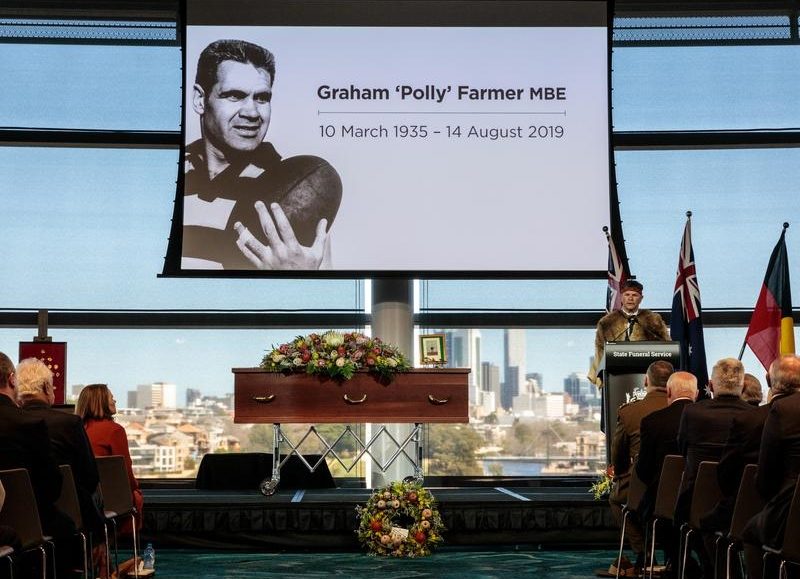
Graham “Polly” Farmer has been remembered at a state funeral in Perth as an inspiring legend of Australian rules football and devoted family man who transformed the lives of thousands of indigenous children through his foundation.
Farmer, the game’s greatest-ever ruckman and the first indigenous coach in VFL/AFL history, died in hospital on August 14 after a 20-year battle with Alzheimer’s disease.
He was aged 84.
Before the service at Optus Stadium on Monday, AFL chairman Gillan McLachlan described Farmer as a giant of the game who revolutionised it with his sweeping handball.
“The expansiveness we see and the ability to do different things, to have flair – he was a leader in that regard,” Mr McLachlan told reporters.
“He been such an inspiration for so many players, particularly in our indigenous cohort.”
Speaking at the service, Premier Mark McGowan said Farmer was a “rare genius”.
“We have never seen his like before and maybe we never will again,” Mr McGowan said.
Fremantle-born Farmer was brought up in a Perth orphanage run by the protestant nun Sister Kate, which left deep and bitter memories for some, but he felt it had a positive influence.
Farmer experienced racial vilification in his life and while Aboriginals had been at the bottom of Australia’s “pecking order”, they were at the top when it came to football, Mr McGowan said.
“Polly was at the top, the peak of the mountain,” he said.
Aboriginal affairs minister Ben Wyatt said many indigenous people felt a sense of pride and “a collective ownership” of Farmer’s achievements.
“Our pride in him and his lack of his own personal grandiosity meant all of us knew him in the singular – Polly.”
Farmer’s son Dean said it was hard to believe his father earned the name at the orphanage because he talked a lot, given he was quiet as an adult.
He described his dad as humble, kind, forgiving and loyal, with “amazing self discipline and competitiveness” – something he found out playing table tennis against him.
Farmer’s daughter Kim said she remembered being crushed by the crowd at Leederville oval as fans tried to get an autograph.
While family life revolved around football, she remembered him reading the newspaper, walking the dog and always talking with passion and conviction.
“To me, he was just dad,” she said.
Jolleen Hicks, a graduate of the Graham “Polly” Farmer Foundation, said thousands of children had benefited from his educational program for Aboriginal youth, which has operated around Australia for 25 years.
“I recognise the impact that Mr Farmer’s vision has had on my life. I want his family to know how grateful I am,” she said.
Farmer moved east in 1962 and played 101 games for Geelong, captaining the club from 1965-67 and winning a premiership medal in 1963.
In 1968, Farmer returned to WA, joining West Perth, adding another 79 games to notch up a senior career total of 356.




